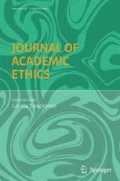Abstract
This study focuses on the intersection of research ethics and academic writing, i.e. the use of sources, assignment of credit to the contributors in the research, and the dissemination of research findings. The study utilized a set of semi-structured and open-ended questions. The sample consisted of 269 undergraduate (BA) and graduate (MA) students at a U.S. university department of psychology including major and non-major students. The data showed that although an overwhelming number of the students’ examples related to ethical issues in citation dealt with plagiarism, a broad range of examples of other types of issues were also provided. Understandably, students tended to view the questions about both the assignment of credit to those involved in conducting the research and the dissemination of research findings from the research participant’s perspective, which is more familiar to them than the researcher perspective. In order to help the students to expand their notions beyond the immediate own experience to a broader understanding for the ethical principles that ought to guide a researcher in his or her work, it is desirable that students be provided with opportunities to participate in authentic research projects. With a deeper understanding of the students’ conceptions of ethics in research and academic writing, we can become more attuned to the common limitations and misconceptions that students harbor, and thus better equipped to support students in their learning process.
Similar content being viewed by others
References
Abasi, A. R., & Graves, B. (2008). Academic literacy and plagiarism: conversations with international graduate students and disciplinary professors. Journal of English for Academic Purposes, 7, 221–233.
American Psychological Association (2007). APA Guidelines for the Undergraduate Psychology Major. Retrieved October 25, 2010 from http://www.apa.org/ed/precollege/about/psymajor-guidelines.pdf
Bebeau, M., Rest, J., & Narvaez, D. (1999). Beyond the promise: a perspective on research in moral education. Educational Researcher, 28(4), 18–26.
Biggs, J. (1999). What the student does: teaching for enhanced learning. Higher Education Research and Development, 18(1), 57–75.
Breen, L., & Maassen, M. (2005). Reducing the incidence of plagiarism in an undergraduate course: the role of education. Issues in Educational Research, 15(1), 1–16.
Butterfield, K. D., Treviño, L. K., & Weaver, G. R. (2000). Moral awareness in business organizations: influence of issue-related and social context factors. Human Relations, 53, 981–1018.
Clarkeburn, H. (2002a). A test for ethical sensitivity in science. Journal of Moral Education, 31, 439–453.
Clarkeburn, H. (2002b). The aims and practice of ethics education in an undergraduate curriculum: reasons for choosing a skills approach. Journal of Further and Higher Education, 26(4), 307–315.
Fisher, C. B., & Kuther, T. L. (1997). Integrating research ethics into the introductory psychology course curriculum. Teaching of Psychology, 24(3), 172–175.
Goodyear, R. K., Crego, C. A., & Johnston, M. W. (1992). Ethicsl issues in the supervision of student research: A study of critical incidents. Professional Psychology: Research and Practice, 23(3), 203–210.
Gullifer, J., & Tyson, G. A. (2010). Exploring university students’ perceptions of plagiarism: a focus group study. Studies in Higher Education, 35(4), 463–481.
Jordan, J. (2007). Taking the first step towards a moral action: a review of moral sensitivity across domains. Journal of Genetic Psychology, 168(3), 323–359.
Marshall, C., & Rossman, G. B. (1995). Designing qualitative research. London: Sage.
Singapore Statement on Research Integrity. (2010). http://www.singaporestatement.org/ (Site visited Nov. 22, 2010).
Sirin, S. R., Brabeck, M. M., Santiani, A., & Rogers-Serin, L. (2003). Validation of a measurement of ethical sensitivity and examination of the effects of previous multicultural and ethics courses on ethical sensitivity. Ethics and Behavior, 13(3), 221–235.
Steneck, N. H. (1994). Research universities and scientific misconduct. History, policies, and the future. Journal of Higher Education, 65(3), 310–330.
Walker, J. (2010). Measuring plagiarism: researching what students do, not what they say they do. Studies in Higher Education, 35(1), 41–59.
Weber, R. P. (1985). Basic content analysis. Newbury Park, SA: Sage.
West, R., & Stenius, K. (2008). The use and abuse of citations. In T. F. Babor, K. Stenius, S. Savva, & J. O’Reilly (Eds.), Publishing addiction science. A guide for the perplexed, 2nd ed. (pp. 98–109). International Society of Addiction Journal Editors.
Yildirim, R., & Ilin, G. (2009). Tutors’ and students’ perceptions of what makes a good undergraduate research paper. Procedia - Social and Behavioral Sciences, 1, 1636–1640.
Zucchero, R. A. (2009). Can psychology ethics be integrated into introductory psychology? Journal of Academic Ethics, 6, 245–257.
Acknowledgements
The author would like to thank the following individuals for their help and support: Professor Laura Koppes for her support; Evelyn Lowery and Kaisa Syrjäkangas for their assistance in the research; Professor Sam Mathews for valuable discussions on ethics in research; and the anonymous reviewers for helpful comments on an earlier manuscript. The initiative was supported through an ASLA-Fulbright (Finland) grant.
Author information
Authors and Affiliations
Corresponding author
Rights and permissions
About this article
Cite this article
Löfström, E. “Does Plagiarism Mean anything? LOL.” Students’ Conceptions of Writing and Citing. J Acad Ethics 9, 257–275 (2011). https://doi.org/10.1007/s10805-011-9145-0
Published:
Issue Date:
DOI: https://doi.org/10.1007/s10805-011-9145-0



